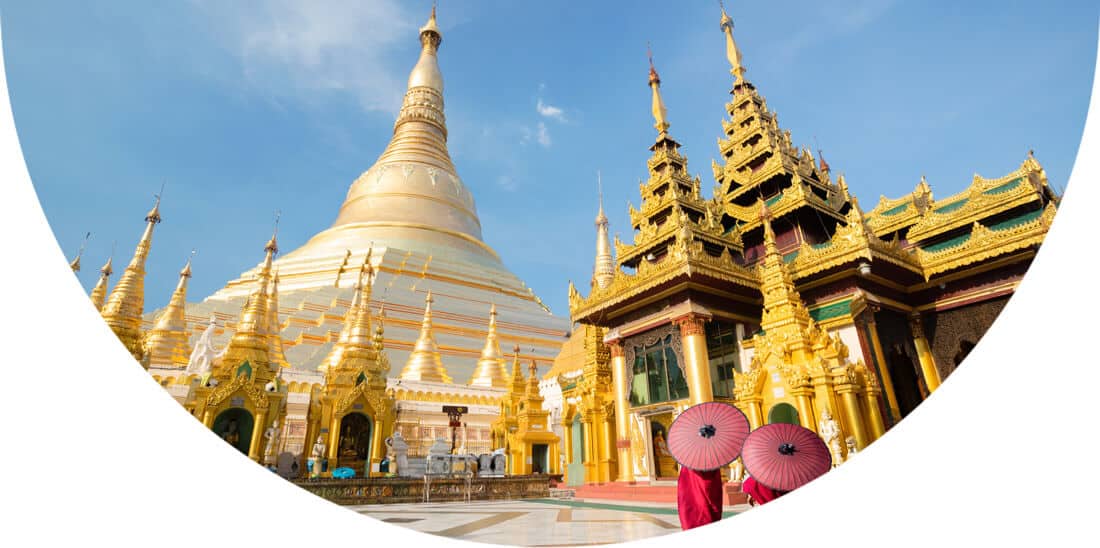Scrub typhus, also known as bush typhus, is a bacterial disease that is spread to people through bites of infected chiggers (larval mites). Common symptoms include fever, headache, body aches, and sometimes rash. It can usually be treated with antibiotics, however people with severe illness may develop organ failure and bleeding, which can be fatal if left untreated.


Travel Vaccinations for Myanmar
Recommended Vaccines for Myanmar
The level of protection needed depends on your medical history and travel itinerary. Book now to get a personalised recommendation from our specialist travel nurses. The consultation costs £20 plus any vaccines you decide to take.
Flexible appointments with no upfront payment
Book Now
Destination Information for Myanmar
The Southeast Asian nation of Myanmar, formerly known as Burma, is bordered by India, Bangladesh, China, Laos and Thailand. It is home to more than 100 ethnic groups. There are a huge array of tourist sites to explore here, including beach resorts, jungles, native tribes, ancient ruins and vast cities. The culture is heavily influenced by Buddhism, although there is also evidence of Indian and Chinese influences in the architecture, food and traditions of the country.
There are many charming cities in Myanmar, including the historic city of Bago, near Yangon by the Gulf of Mottama, which hosts wonderful Buddhist sights. Yangon itself is the economic centre of Myanmar, with its iconic colonial architecture. Sadly, much of Myanmar is closed to foreign travellers, although many popular tourist destinations such as Yangon (Rangoon), Mandalay, Inle Lake and Bagan are open.
For isolated beaches and peaceful spiritual sites, Myanmar is a challenging, yet unbeatable, destination. Much of the infrastructure of the country is still in the process of being built or developed, so you may find getting around rather difficult. Travel restrictions are in place in some areas, with permits required for others, so it is advised to do your research before visiting, and plan your trip meticulously.
Anyone travelling to Myanmar requires hepatitis A, typhoid, tetanus, diphtheria and polio vaccines. Also depending on which regions you visit, additional vaccines may be required such as hepatitis B, Cholera, Japanese Encephalitis and Rabies – these are important, so we advise that you book an appointment with our travel health experts to find out exactly what you need.
Infections and Outbreaks frequently change from country to country and by attending our clinics you will be given the most up to date clinical and safety advice from our team of specialists. Our advice to you often includes aspects such as:
- Food and water hygiene
- Insect and animal bite avoidances
- Personal safety
- Sexually transmitted infections
- Sun protection
- Altitude sickness
Malaria and regions within country:
There is a high risk of P.Falciparum malaria throughout the country. The only areas with low to no risk are the cities of Mandalay and Yangon.
Non Vaccinated Diseases
Additional Health Risks Information for Myanmar
The political situation in Myanmar is unstable, with protests, conflicts and the possibility of violence in certain areas. In general, crime against tourists is rare, but it is possible, so you should always take sensible precautions and look after your personal possessions properly. Areas surrounding the border with China are not advised for tourists to visit due to the likelihood of armed conflicts and ongoing military activity. Many destinations within Myanmar are subject to restrictions or limitations – check the information and recommendations for your specific area of travel before beginning your trip.
During the rainy season from May to October flooding is widespread and roads may become damaged or impassable. If you need medical treatment while in Myanmar, head to the cities of Rangoon or Mandalay, where you are most likely to receive advice and treatment of a reasonable standard. Outside of these areas, medical care may not be available. Hygiene standards are not the same as in the UK, so avoid any extensive treatment unless it is an emergency. Drink only bottled water and take care of what you choose to eat.
There are mosquitos in Myanmar, and reported cases of Japanese Encephalitis and dengue fever, which can be fatal, so consult a travel clinic to discuss vaccination for Japanese encephalitis before your trip. Take all possible precautions to avoid being bitten by mosquitos by using insect repellent with 50% deet.



